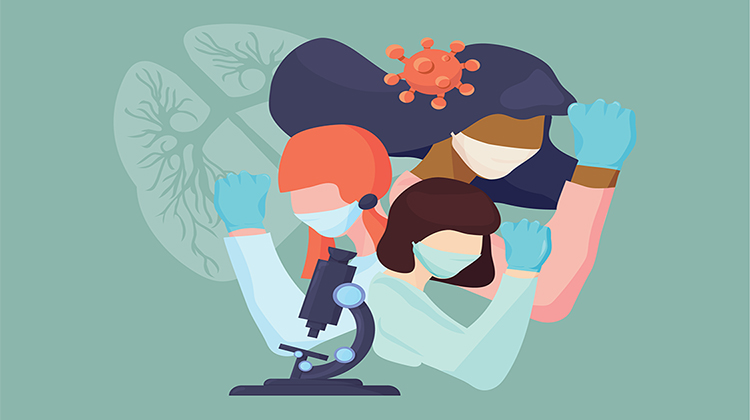Women in Stem with Lidia Pieri
Posted: 19 April 2024 | Dr Lidia Pieri (Sibyla Biotech) | No comments yet
Lidia Pieri earned a Master’s degree with honours in high energy physics at CERN, a PhD in theoretical astroparticle physics from Rome-3 (Italy) and an Executive MBA in Business Innovation with honours from the MIB school in Trieste. During the academic period she gained international exposure and recognition working as a research associate in several highly ranked institutes in Europe and authoring tenths of peer-reviewed papers in astrophysics, high energy physics, and computational biophysics. She proactively helped create new practices and a multidisciplinary research group, where she experienced scientific and team project management.
Driven by a never-stopping scientific passion for incoming technologies and their possible exploitation for a better future, in 2017 she played a key role in the vision and founding of Sibylla Biotech.


Can you tell us about your journey in the field of STEM and the challenges you encountered along the way?
In the STEM area, I was born as a physicist, which was – among many other things – the inception of looking at the world from many different points of view to get the big picture without losing the fascination with mystery. This eventually translated into looking at my life from many points of view, without fear of change, which opened many opportunities.
After ten years of exciting postdoctoral research around Europe in the astroparticle physics sector, hunting for dark matter at yet another offer from a foreign institution, I chose to create space for my life instead.
After years of exceptional but inconclusive multi-messenger data inflow from space experiments and colliders, dark matter research was stuck in a moment when the next experimental data would have come in tens of years. Pure theoretical research is not in my chords, and I felt uncomfortable not being challenged by data.
AI-powered drug discovery: Accelerating the development of life-saving therapies
18 September 2025 | 14:00PM BST | FREE Webinar
Join this webinar to learn how AI is accelerating early-stage drug discovery and improving target identification, practical strategies for applying AI effectively within your organisation and to ask your questions to our industry expert! Dr Remco Jan Geukes Foppen will share practical insights into how AI is being applied across the pharmaceutical sector, helping teams move faster and make better-informed decisions. With experience spanning data management, image analysis, bioinformatics, and machine learning in clinical research, he brings both deep technical expertise and strategic understanding of real-world challenges.
Register Now – It’s Free!
At the same time, I was married and felt it was time to settle. So, two big challenges: compromising between passion and job, and between family and job. I left academia and made a turn in my life, founding and managing an Argentine tango academy. Over the years, I came to perform in Buenos Aires and created a cross-cultural reality that made its mark and was recognised worldwide. Then, I became a mother. An evolution that, amid much joy and some pain, I lived as an unrepeatable moment.
I was always driven by the need to create, understand, wonder, and make space in the chaos. When the idea for Sibylla, which my husband co-authored and I could then witness with a privileged point of view, came along, I had no doubts about taking up the challenge of leading the company. As a non-academic with a scientific background, I had time and understanding.
To gain competencies, I started studying again – getting an executive MBA in business innovation. I gathered my talents and all that my years in STEM had taught me. I recognised, from the elegance and immensity of divergent thinking in Sibylla’s idea, the potential to save lives. It still blows my mind to think about it. And so, I have been the managerial co-founder and CEO of Sibylla since 2017.
Sibylla’s scientific founders come from very different scientific fields that do not usually speak to each other, such as theoretical physics, molecular biology and pharmaceutical chemistry. This multidisciplinary approach is at the heart of Sibylla.
Identifying new drugs is an extremely complex project. To innovate in complex fields, you have to get out of your comfort zone, think divergently, merge different paths, and seek excellence toward a single goal, which, in this case, has the potential to save millions of lives.
The scientific founders have developed a pioneering method for drug discovery that applies to the research and design of new drugs effective against diseases that are incurable to date. The idea behind Sibylla is that it is possible to target a protein during the folding process, leading it to degradation. The discovery of the folding intermediate states to target has been enabled by our proprietary computational platform, and the development of small molecule folding interfering degraders is now accelerated by a proprietary AI platform. Our technology is designed to be applicable to every therapeutic area, including oncology and neurodegeneration. We are now in the preclinical stage of developing a proprietary drug pipeline. We also have collaborations with pharmaceutical companies where we leverage the best of our unique platform and pharma expertise on the target.
My STEM story today is different from where it started. Yet, I am sure I could only be here with the STEM mindset, bringing endurance, perseverance, attention to detail and a rational approach to the big picture.
What inspired you to pursue a career in STEM, and how did you overcome any obstacles or biases you may have faced?
As a child, I wanted to be an astronaut. I chose physics out of an aesthetic need, paradoxically. I was fascinated by the idea that I could study and understand the elegance of the laws that govern the cosmos. I did not become an astronaut, but I could study the enigma of dark matter. I find it exciting that human beings can “drown their thoughts in the immensities” of scientific discoveries related to the nature of the universe. I wanted to understand. To participate. That is why I chose physics, and I have never regretted it.
The young generation of researchers I worked with always made me feel at ease, in the right place, and in the right moment. I was lucky to have started my career around the year 2000 when most of the bias in the physics community was gone.
The real obstacle came when I started thinking about a child. With no support from our families living in other cities, I relied on my husband, who shared parenting joys but, above all, responsibilities. There was no other kind of support. Reconciling parenthood and job allowed me to grow in my life, co-found and lead Sibylla, and possibly help make an impact for millions of people worldwide. That’s why today in Sibylla, I have implemented a serious welfare plan that is enhanced in the case of parenting. I think that enabling families to keep on with their life objectives is due to the evolution of the world in which my child will grow up.
Could you share an example of a specific project or research that you have worked on and the impact it has had in your field?
Sibylla Biotech is born out of a multidisciplinary approach. The original idea was to apply mathematical methods derived from theoretical quantum physics to simulate protein folding, leading to an innovative and possibly disruptive approach in the field of drug discovery. There was a need to understand and communicate this idea to external stakeholders, as well as a need to translate this into a business idea. That was my task during Sibylla’s inception.
Being a physicist, understanding the concept so deeply as to then be able to translate it into the seed of a commercial opportunity was not difficult. For all my life I had created patterns and opportunities out of experimental data, framed them into a rational design, envisioned the next thing to do to give them more strength, and created a sound and solid go-no-go decision pathway. This was what I did with Sibylla.
Our research unravels the complexities of protein folding, particularly focusing on the elusive intermediate states. By transcending traditional experimental methods, our work has provided unprecedented insights into these transient structures, offering new targets for therapeutic intervention.
This research has not only deepened our understanding of protein dynamics but has also led to the development of Sibylla Biotech’s unique drug discovery platform. Central to this is our PPI-FIT technology, which enables us to identify and target previously unexplored protein states. This innovation opens the door to novel treatments, especially for proteins considered ‘undruggable’ in their mature forms, marking a significant stride in the field of protein degradation and pharmaceutical development.
How has your research in STEM contributed to advancements or improvements in your field, and what potential future applications or implications do you foresee based on your work?
The implications of Sibylla Biotech’s research extend beyond the confines of a single project, casting potential influence on the broader STEM fields. By integrating current physics-based and AI/ML-based approaches to rational drug discovery with molecular biology and pharmacology, our work exemplifies the power of interdisciplinary research in advancing scientific knowledge and application. This synthesis of disciplines has not only expanded the toolkit available for drug discovery but also set a precedent for innovative problem-solving approaches in STEM.
Looking ahead, the potential applications of our findings are transformative. The ability to target intermediate protein structures heralds new possibilities in treating a spectrum of diseases, particularly in areas like oncology and neurodegeneration, where traditional therapeutics have faced limitations. Our ongoing research and development are poised to explore these avenues, aiming to address complex diseases with novel therapeutics. As we continue to refine our technology and methodologies, the future implications for patient care, treatment outcomes, and overall health science are transformative, breaking new ground in the understanding and treatment of diseases.
As a woman in STEM, what unique perspectives or strengths do you believe you bring to your work?
I want to answer with the words of the late Professor Renzo Leonardi, who first gave credence to the crazy idea of using theoretical physics to simulate protein folding, which opened up the path to Sibylla: “Not those who begin, but those who persevere.” Life is never an easy path if you want to live it at full speed, not because you are a woman, but because it is not by nature. If you want to do something great in life, there are no shortcuts. But in return, you will have the satisfaction that will have been worth the ticket to life.
Perseverance, a sense of purpose that may overcome fragilities, hunting for the big picture, and a sense of wonder and vision are my unique perspectives as a woman in STEM. Not to mention the never-ending urge for continuous learning, and the unwavering commitment to accept challenges as opportunities.
This STEM thinking accompanies me every day, even in a career that may not directly be labelled as STEM but is so highly STEM-infused.
What advice would you give to young women who are considering a career in STEM but may be hesitant due to societal stereotypes or perceived challenges?
Go and rock!
And look for work environments that will not ask you for a compromise.
How do you see the representation of women in STEM changing over the years, and what further progress do you believe is needed?
Equal opportunity must not even be a point for discussion anymore. The world has changed, and I believe it’s only a matter of time before more and more women will fill managerial and other pivotal roles. We have to keep educating little girls in this changed world so they may dream high and feel no boundaries due to gender. My husband and I are educating our little boy as well, that there are no differences. We all have to do our part.
In your opinion, what can organisations and institutions do to create a more inclusive and supportive environment for women pursuing STEM careers?
There is a serious need to implement sound parenting support policies and educate children about inclusion. Period. Pink quotas may show the way, but they do not, in my opinion, solve the problem. I could count on an exceptional husband determined to give me space in the new family configuration. Many women cannot because they do not have a partner or their partner has a full-time, 8-hour-a-day job.
The work environment, family, and the state must put the need for a parent to pursue a career at the centre of their values. Also, I would like to see no institutional tolerance and severe fines against companies that do not implement equal opportunities.
Looking ahead, what exciting developments or advancements do you foresee in your field of STEM, and how do you envision your own research contributing to those future innovations?
My STEM thinking allowed me to engrave a scientific development outside of my initial field of research, to be able to share it and, therefore, attract commercial interest. It allowed me to critically analyse the landscape and envisage the big picture of a business plan to attract investments, budget it, and organize operations to make it work in order to lead and grow a company from a stunning idea to a team of 27 passionate and committed beautiful people with international investments and collaboration with pharma companies.
This team – 65 percent women and 50 percent women in managerial roles- thinks globally and boldly, makes solid science without shortcuts, and can reach the top. The only evolution I can foresee is that we will change the lives of millions of people by finding a cure for untreatable diseases.
About the author


Co-founder & CEO of Sibylla Biotech
Lidia Pieri earned a Master’s degree with honours in high energy physics at CERN, a PhD in theoretical astroparticle physics from Rome-3 (Italy) and an Executive MBA in Business Innovation with honours from the MIB school in Trieste. During the academic period she gained international exposure and recognition working as a research associate in several highly ranked institutes in Europe and authoring tenths of peer-reviewed papers in astrophysics, high energy physics, and computational biophysics. She proactively helped create new practices and a multidisciplinary research group, where she experienced scientific and team project management.
Driven by a never-stopping scientific passion for incoming technologies and their possible exploitation for a better future, in 2017 she played a key role in the vision and founding of Sibylla Biotech.
As a co-founder and CEO, she raised € 25.4M of VC investment, fostered and negotiated a collaboration contract with Takeda Pharmaceutical, built the business and financial plan and led the operations. Engagement and satisfaction of the employees, as well as an ethical use of strengths and competencies are among her major commitments.
Related topics
Drug Delivery, Drug Development, Drug Discovery
Related organisations
Sibylla Biotech
Related people
Lidia Pieri (Sibylla Biotech)








